-
Asia, Middle East lead rise in 2015 arms imports
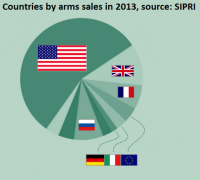
The volume of international transfers of major weapons has grown continuously since 2004 and rose by 14 percent between 2006 and 2010 and 2011–2015, according to new data. Six of the top ten largest arms importers in the 5-year period 2011–15 are in Asia and Oceania. Arms imports by states in the Middle East rose by 61 percent between 2006 and 2010 and 2011 and 2015.
-
-
Integrating markets to offset climate-related food insecurity
Global market integration is key to buffering future commodity prices and food security from the negative effects of climate change on agriculture. Rising temperatures and an increase in extreme weather events will likely have adverse impacts on global crop production, leading to higher food prices and food scarcity. But global markets that have the ability to deliver food where it is needed most could help offset these consequences.
-
-
Ebola crisis provides framework for how to respond to outbreaks like Zika virus
As world leaders grapple with containing the Zika virus, the Ebola epidemic in West Africa provides valuable lessons for how to respond to other infectious disease epidemics, according to a just-published policy report. Rebuilding local health care infrastructures, improving capacity to respond more quickly to outbreaks and considering multiple perspectives across disciplines during decision-making processes are among the key recommendations the authors propose.
-
-
The little-understood connection between Islamic terror and drug profits
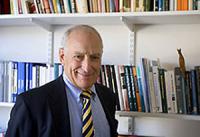
Terrorists are in it as much for the loot as for the ideology. The Islamic State, or ISIS, could hardly exist, whatever its Islamist fervor, without hard cash from sales of pilfered petroleum, taxes on its subject population and kidnappings for ransom. Likewise ISIS- and al-Qaeda-linked groups in Africa prosper by trafficking drugs across the Sahara and by offering “protection” to smugglers who have long been trading illicit goods throughout the continent. Although Westerners tend to think of these groups as driven by ideology, new recruits may be more attracted by opportunities to make money. Combating terror in Africa, at least, now depends as much on cutting off insurgents from their sources of income as it does on defeating them on the battlefield – a much longer, tougher, and more costly pursuit.
-
-
Boko Haram burns children to death in attack on Nigerian village
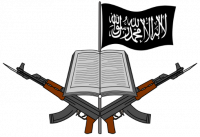
Boko Haram Islamist extremists have burned children to death in an attack on the Nigerian village of Dalori Saturday evening. In all, sixty-five people died in the attack. The militants set the buildings on fire, and as the fire spread, they shot people who were attempting to escape the flames.
-
-
How French strategies prevented Al Qaeda's expansion in Mali
There have been many books on the U.S. wars in Iraq and Afghanistan, but there are few about the recent military interventions of America’s allies in countries such as Mali and others on the African continent. Because the January 2013 French intervention in Mali against the local Al Qaeda affiliate was quick, effective, and relatively low cost, the story contains valuable lessons for future strategy.
-
-
Senegal bans burqas to prevent terrorists from using the Islamic dress as a disguise
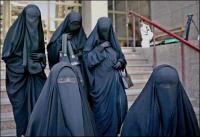
Against the background of growing concerns about the potential of Islamic extremism in the country, the Senegal government has decided to ban the burqa, the body-and-face-covering dress traditional Muslim women wear. In banning the burqa, Senegal is following the example of Chad and Cameroon, two other countries with large Muslim populations, which banned the traditional dress earlier this year. Senegal’s interior minister, said women would no longer be allowed to wear the Islamic dress, which leaves only the eyes exposed. He said the decision was taken out of concern that terrorists might be using the burqa as a disguise.
-
-
U.S. deploys 300 U.S. troops to Cameroon to bolster campaign against Boko Haram
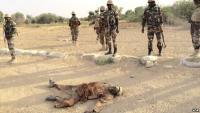
President Barack Obama on Wednesday notified the Congress of his plan to deploy 300 troops to Cameroon to provide intelligence, surveillance, and reconnaissance operations to the militaries of Nigeria, Cameroon, Chad, and Niger as they battle the Islamist Boko Haram insurgents. In a letter released by the White House, the president said ninety personnel had already been deployed, and that they would be armed for self-defense. A senior administration official said the deployment was “part of the counter Boko Haram effort.”
-
-
The growing link between intelligence communities and academia
The events of September 11 2001 were a catalyst for change in the intelligence profession.One noticeable change: The number of universities offering an intelligence studies-related degree has grown from a handful to few dozen. Universities are starting to develop curricula that feature practical real-world exercises and structural analytical techniques. This is often happening in collaboration with the intelligence community. Like most businesses or agencies do, universities are starting to develop specific niches. This expansion is being led by the International Association for Intelligence Education (IAFIE), which was formed in June 2004. The field will only grow. It’s a necessary expansion to produce the professionals needed to ensure America’s national security and that of its allies for generations to come.
-
-
Morocco blocks opening of Ikea store after Sweden announces support for breakaway Western Sahara republic

Ikea was scheduled to open its first store in Morocco today, but the Moroccan government has blocked the opening because the store lacked a “conformity permit,” a statement from the Interior Ministry said yesterday. Earlier on Monday, a news Web site close to the Moroccan palace said the store was not allowed to open because of Sweden’s plans to recognize an independent state – to be called Sahrawi Republic — championed by the Polisario Front in the Western Sahara. Morocco claims sovereignty over the Western Sahara.
-
-
U.K. to deploy troops in Somalia, South Sudan to foster “less terrorism and less migration”
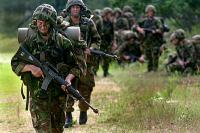
British prime minister David Cameron has said that hundreds of British troops will be deployed to Somalia and South Sudan to train African peacekeeping forces in order to foster “less terrorism and less migration.” Over the years the United Kingdom has contributed to many peacekeeping missions, but now its role is largely limited to providing about 280 troops participating in the current mission in Cyprus. The United Kingdom has also given about £260 million in aid to South Sudan since the start of the civil war in December 2013.
-
-
Central African Republic on verge of becoming a failed state
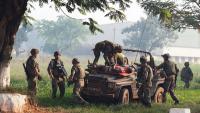
The Central African Republic (CAR), one of the poorest countries in the world, suffers not only from mass atrocities and misrule, but also a dangerous dependence on aid, said the International Rescue Committee (IRC) in a report released the other day. Since early 2013 over half of CAR’s population has been the victim of sectarian violence which has cost over 6,000 deaths, leaving 2.7 million people in need of emergency assistance. Harvests have decreased by 58 percent and 1.52 million people are food insecure.
-
-
Libyan factions, outside powers use southwest Libya tribes in proxy war
Since September last year, a bloody war has been raging between the Tuareg and Tebu, two indigenous tribes in the remote Saharan oasis town of Ubari, in Libya’s rich southern oil fields near Libya’s border with Algeria, Niger, and Chad. Each side is supported by different Libyan factions and outside forces, all vying for control of the mineral-rich and politically volatile area. As the United States and Europe grow more concerned about the growing presence of ISIS in Libya, they have begun to pay more attention to the war between the Tuareg and Tebu and the potential it offers for ISIS for more mischief.
-
-
Water security key to unlocking African prosperity
There is mounting evidence of the risks posed by water scarcity to business and economic growth. A 2012 projection by the International Food Policy Research Institute says 45 percent of total GDP — $63 trillion — will be at risk due to water stress by 2050. With coordinated action, better water provision in Africa will strengthen economic growth and unlock the path to prosperity for millions, according to SABMiller’s Chief Executive Alan Clark.
-
-
Western Sahara conflict reaches British court
Europeans are familiar with efforts, some of them successful, to label agricultural and consumer products produced by Jewish settlers in the West Bank as coming from the Palestinian West Bank, not from Israel, in order to allow consumers to make an educated decision about whether or not they wish to support Israel’s continuing occupation of that territory. A similar effort is now underway in the United Kingdom to label produce coming from Western Sahara. The campaign, launched by campaigners for the freedom of Western Sahara, aims to weaken Morocco’s claim to, and control of, the disputed territory. Morocco, which took control of the territory after Spain, in 1975, ended its colonial rule, regards the Western Sahara as the kingdom’s “southern provinces.” The indigenous Saharawi people want self-determination by establishing an independent state called the Sahrawi Arab Democratic Republic (SADR).
-
- All
- Regional
- Water
- Biometrics
- Borders/Immig
- Business
- Cybersecurity
- Detection
- Disasters
- Government
- Infrastructure
- International
- Public health
- Public Safety
- Communication interoperabillity
- Emergency services
- Emergency medical services
- Fire
- First response
- IEDs
- Law Enforcement
- Law Enforcement Technology
- Military technology
- Nonlethal weapons
- Nuclear weapons
- Personal protection equipment
- Police
- Notification /alert systems
- Situational awareness
- Weapons systems
- Sci-Tech
- Sector Reports
- Surveillance
- Transportation
Advertising & Marketing: advertise@newswirepubs.com
Editorial: editor@newswirepubs.com
General: info@newswirepubs.com
2010-2011 © News Wire Publications, LLC News Wire Publications, LLC
220 Old Country Road | Suite 200 | Mineola | New York | 11501
Permissions and Policies
Editorial: editor@newswirepubs.com
General: info@newswirepubs.com
2010-2011 © News Wire Publications, LLC News Wire Publications, LLC
220 Old Country Road | Suite 200 | Mineola | New York | 11501
Permissions and Policies
